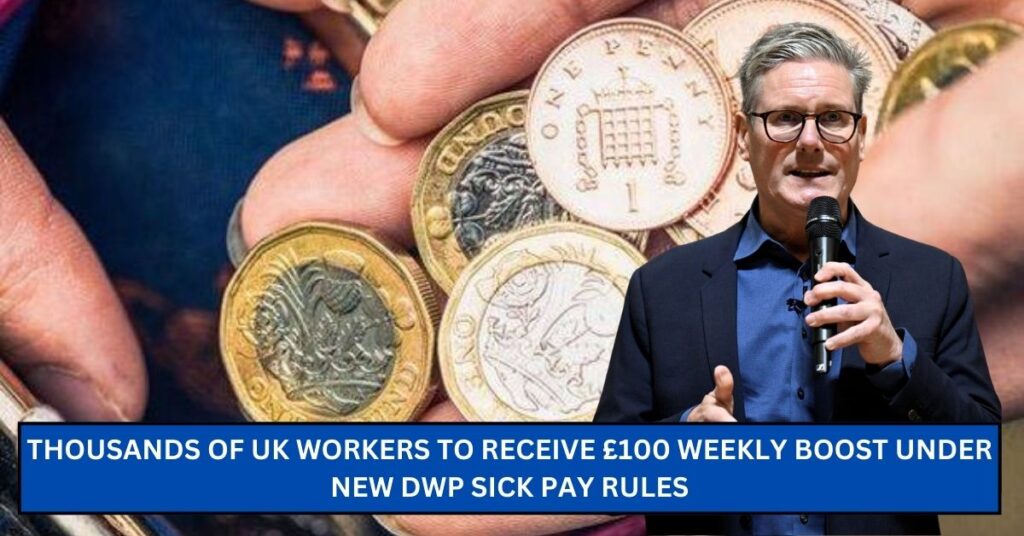Thousands of low-income workers across the UK are set to receive a £100 weekly boost following a significant change to Statutory Sick Pay (SSP) rules. The Department for Work and Pensions (DWP) has introduced this reform to extend financial protection to workers who were previously ineligible for SSP due to low earnings.
The change, which is part of the Employment Rights Bill, ensures that those earning below the Lower Earnings Limit (LEL) of £123 per week will now qualify for sick pay covering up to 80% of their wages. This move aims to reduce financial hardship for workers who are forced to take time off due to illness.
Why Was the Rule Changed?
Before this reform, Statutory Sick Pay (SSP) was only available to employees earning at least £123 per week. This left out over 1.3 million low-income workers, particularly those in part-time roles, gig economy jobs, and multiple low-paying positions.
Many workers, despite being employed, were unable to claim sick pay when they fell ill, forcing them to either work through sickness or lose income entirely. The new rule ensures that more workers are protected financially during periods of ill health.
Source: Gov.uk – Statutory Sick Pay Rules

How Much Will Workers Receive?
Under the new system, eligible workers will receive:
- 80% of their average weekly earnings, up to the SSP cap of £116.75 per week.
- For workers earning £100 per week, this means £80 in sick pay when unwell.
- For workers earning £150 per week, the standard SSP rate of £116.75 applies.
This approach ensures that low-income workers are not entirely without financial support during illness.
Source: The Guardian – UK Sick Pay Reform
Who Will Benefit?
This reform will positively impact thousands of workers across multiple sectors, including:
- Part-time workers who previously did not earn enough to qualify.
- Freelancers or gig economy workers with low weekly earnings.
- Hospitality and retail employees working limited shifts.
- Domestic workers, cleaners, and carers employed on low-hour contracts.
Source: Financial Times – Impact of Sick Pay Reform
Government’s Justification for the Change
The government introduced this change to improve workers’ rights and reduce economic insecurity. The key reasons include:
- Fairer sick pay system: Ensuring that all workers have financial protection when they fall ill.
- Reducing workplace illness spread: Encouraging sick employees to take time off rather than work through illness.
- Supporting low-income earners: Addressing the gap where millions of workers were previously ineligible for SSP.
Source: The Guardian – Employment Rights Bill
Concerns from Businesses
While the reform has been widely welcomed by workers’ rights groups, small businesses and employers have raised concerns about the financial burden of extending sick pay eligibility.
- Federation of Small Businesses (FSB) has called for government-funded support to help small employers manage additional costs.
- Some business owners worry that increased SSP costs may lead to fewer job opportunities for low-hour employees.
- The government is considering potential rebates for small businesses that struggle with the cost of expanded SSP.
Source: Financial Times – Small Business Response
How Workers Can Claim Sick Pay Under the New Rules
If you previously earned below £123 per week and were ineligible for SSP, you can now:
- Check if your employer has updated policies to reflect the new sick pay rules.
- Provide a doctor’s note or self-certify illness for up to 7 days.
- Request sick pay from your employer as soon as you fall ill.
- Ensure your employer follows the updated SSP guidelines.
For official SSP guidance: www.gov.uk/statutory-sick-pay

Conclusion
This DWP rule change is a major victory for workers’ rights, ensuring that thousands of previously excluded employees now receive financial support when sick. By extending eligibility and increasing sick pay coverage, the government aims to reduce workplace illness, improve job security, and protect low-income workers.
While concerns about business costs remain, the new policy is a step toward a fairer and more inclusive welfare system. Workers should check with their employers to ensure they benefit from this rule change and are protected when illness strikes.
If you believe you aren’t receiving the correct sick pay, seek advice from Citizens Advice UK or contact your employer directly.
This article has been carefully fact-checked by our editorial team to ensure accuracy and eliminate any misleading information. We are committed to maintaining the highest standards of integrity in our content.



